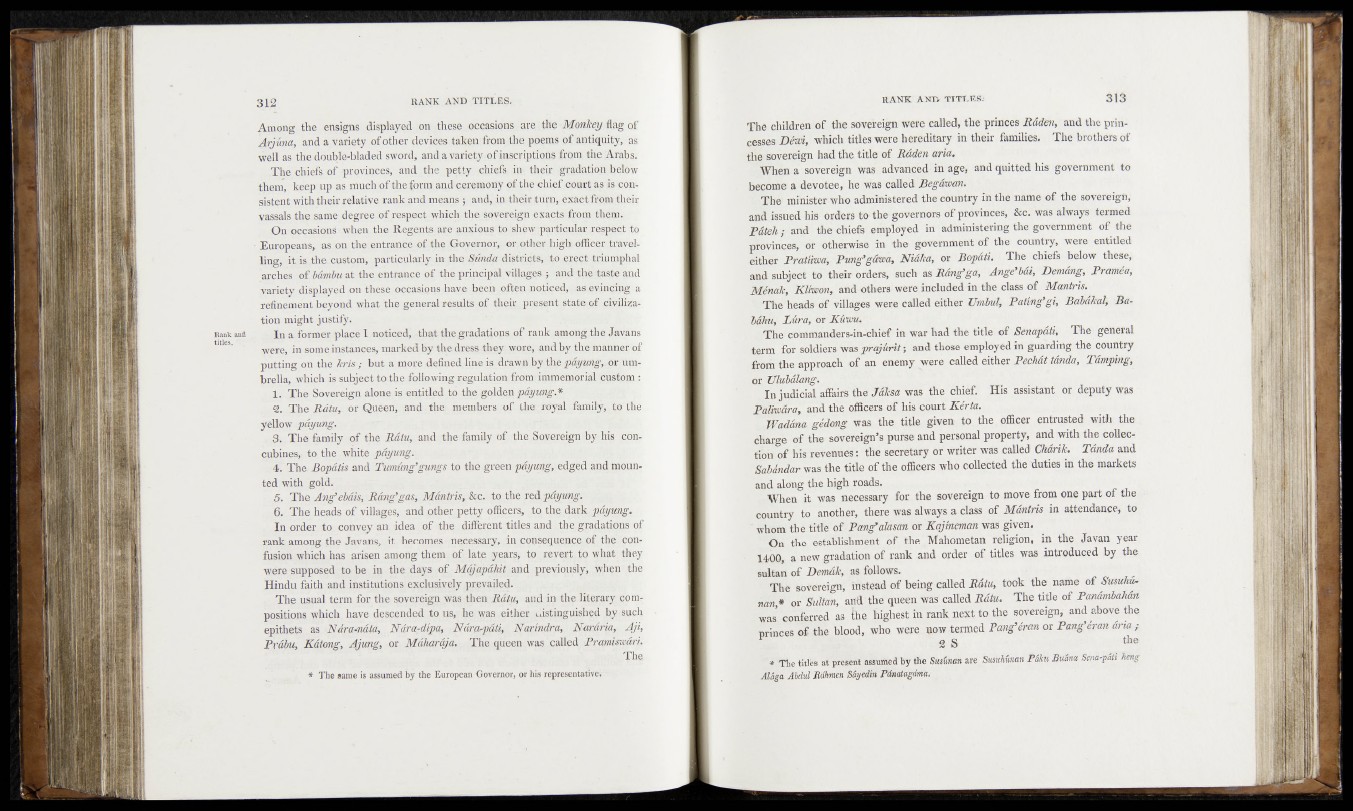
Among the ensigns displayed (on ythese.occasions are, j t h e f l a g of
Ayjüna, and a.-variety of other devices taken'fromjthè poems pf'antiquity, -as
well as the dodhlë-bladed sword; and a variety , of dngprigtions from: tbejArkbs.
The chiefs, of provinces,- and .tha,,petty, .chiefs, in their gradation below
them, keep- up as much of the farmland ceremony of the chief .epurt; jfô'-ig (consistent
with their relative rank and means ; and, in.their turn, exàct-from(their,
vassals the same degree Ofrespect which:the.soyereign exacts -from them.
On occasion^ when the Regents are anxious to shew ■particular <re_spect 'jto
Europeans, as on the^entrance of the Governor,,, or qther higlÿ officer t r a i ling,
it is.the._custoni, particularly in the Sunda districts,fgbp.pr.ect triumphal
arches ;p£ bâmbu at the entrance of the principal, villages ; and thejtasjje and
variety displayed ton Ih^e^occasiogs/have been^often .noticed, ..pspyipcjtpg a
jefinement-beyond what the general results of theh^present,state of cffl%a-
tion might justify.
Ban* anfl In a former place I noticed, -that, the gradations.,of rank among the Javans
tlteE' '1 were, in-some instances, marked by the dress they, wore, and by the manner of
putting on the kris ; but a more defined line is drawn,byr$j£ pâ yu â g ,,^pjjgp:-
brella, which is subject to the following regulation from immernpml'gustogj,:
1. The Sovereign alone is entitled to the golden pâyung.*
2. „The Râtu, or Queen, and the members of the-royal family, |^f|n e
yellow pâyung.
,..5, The family of the Râtu, and the-family of the Sovereign, by|hi$ .concubines
»! to. the white .pâyung.
4. The Bopâtis and Tumung’gungs to the-green paymg,edged and mounted
with gold jy i -
7' 5. The Jng’ebâis, Râng’gas, Mântris, &c. to the red pâyung.
6. The heads of villages, and pfeberpetty officers, to tlpylark pâyung.
In order to . convey an idea of the different titles and the^gradations of
rank among thé Javans, it becomes necessary, in .consequence o f J ^ ’pon-
fusion which has arisen among them of late years» to revert to what, they
were supposed to be in the days of Mâÿapâhit and previously,, „i^ken ;the
Hindu fhith and institutions exclusively .prevailed.
The usual term for the sovereign was then Râtu, and in the literary compositions
which have descended to us, be was either uistinguisb^ ^ytspch
epithets as Nâra-nâta, Nâra-dîpc^ Nârapâti, N arindr,a, Navaria,
Prâbu, Kâtong, Ajung, or Mâharcya. The queen was called Pramswari.
I The
* The same is assumed by the European Governor, or his representative;
Thé children» of the sovereign were called* the princes RM m, and the princesses
Démi, which titles were hereditary in their families. Thé-brothers of
the sovereign had the title of Râden aria.
When a sovereign was advanced- in age, and quitted his government to
become a devotee, he was called Beg&wan.
The minister who administered the country in the name of the sovereign,-
and issoed hie ©refers to- the governors of provinces, fee. was always termed
pâteh ; and the chiefs employed in administering the government of the
provinces, or otherwise in 'tip government of the .country, wete entitled
either PratiitM, Pmg'gûwa, Mâha, or Bepâti. The chiefs- below these,-
and subject to their orders, such as Râng’gà, Ange'bât, DemaMg, Praméa,
Ménah, Klvmm, and others were included in the class of Mantris.
The heads of villages were called either ZJmbul, Pating-gi, BubakaV, Ba-
bâhu, Lûra , or Kûwu,
The- commanders-in-chief in war had the title ■ of Senapati, The- general
term for soldiers was prajùrlt-, and those employed in guarding the country
from The approach -of an enemy were called either Péchât tânda, Tamping;
or Ulubalang.
Injudicial affairs the Jâlcsa was the chief. His assistant or deputy was
Palmâra, and t£e officers of his 'çourt Kérta.
Wadâna gédong was the title given to. the. officer entrusted with the
Chargé of the sovereign’s purse and personal property, and with the collec-
fmh of his revenues : the secretary or writer was called Chârik. Tânda and
Sabdndar was the title of the officers who collected the duties in the markets
and along the high roads. , . I.' ' .
When it was necessary for the sovereign to move from one part of the
country to another, there was always a class of Mântris in attendance, to
' whom the title of Pang*atitsan or Kajbtemdn was given.
Ón the establishment of the ^Mahometan religion, in the Javan year
1400, a new gradation of rank and order of titles was introduced by the
sultan of DemaJc, as follows. :
The sovereign, instead of being called Râtu, took the name of Susuhu,
nan * Qr Sultan, arid 'the queen was called Râtu. The title of PanâmbaMn
was' conferred as feie highest in rank next, to, the sovereign; and above thq
princes of the blood, who were now termed Pang’érm or Pangêran âria-ï
P 2 3 the
* -n e titles at present assumed by the Susûncui are SumMman Pâku Butina Sené-paiï Mag
Alâga Abdul BÜhmen Sâyédià Pikaiagdmà.